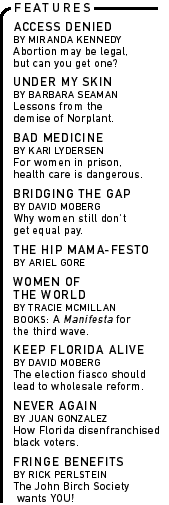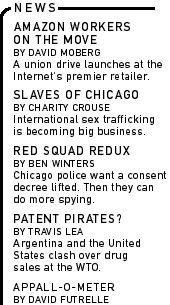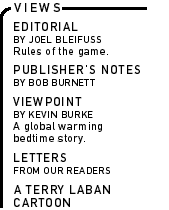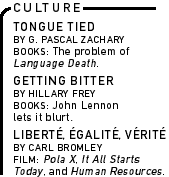
|

|

|

|
| |
|
|
|
Lennon Remembers On February 7, 1964, the Beatles traveled to America for the first time to appear on the Ed Sullivan Show. On Pan Am Flight 101, in mid-air halfway across the Atlantic, a young and doubtful George Harrison worried to a journalist traveling with the band, "They've got everything over there, What do they want us for?" Thirty-six years later, one might ask: What do we still want them for? Although they are no more, the Beatles have a grip on America that appears to be as strong as ever. There's a new Beatles CD out, comprised of the Fab Four's chart-toppers and simply
com), while Paul McCartney and Yoko Ono, whose talents in the visual arts are by no means similar, each have solo shows on exhibition. A new cookbook called She Came in Through the Kitchen Window: Recipes Inspired by the Beatles and Their Music (sample dish: "I Am the Scrambled Eggman") has just been published, while movie director Milos Forman recently announced that the Beatles were crucial to ending the Cold War. In the midst of this Beatlemania with everything but the band itself, lefty publisher Verso has reprinted a small book of interviews with the notoriously "clever" Beatle called Lennon Remembers. Coinciding with what would have been Lennon's 60th birthday on October 9 (and the 20th anniversary of his murder on December 8, 1980), as well as the re-infection of Beatles fever among the masses, re-issuing Lennon Remembers appears to have been a shrewd marketing move for noncommercial Verso. Thankfully, it's more complicated than that. Not only do all profits from this and previous editions of Lennon Remembers go to gun-control projects, there's something deliciously subversive about its publication amid the new hoopla. The interviews, conducted in 1970 by then 24-year-old Rolling Stone editor Jann Wenner, first published in Rolling Stone and then book form in 1971, are at their core about deflating the Beatles myth, not perpetuating it. In Lennon Remembers, John Lennon candidly (for lack of a stronger word) discusses his first solo album after the Beatles' breakup (Plastic Ono Band), his early days with Paul and George, drugs, Yoko (who sat in during the interviews), Beatles business, songwriting, other pop stars, religion, primal scream therapy and lots of other stuff. The dynamic between Wenner and Lennon changes from question to question; Lennon's mood shifts constantly throughout the book. It's a kick to read Lennon in this long interview format, to experience him unfiltered in a way so many journalists never allowed; he wasn't at all a saint, nor did he want to be. Remembering the first time he and George took LSD--unbeknownst to them, a dentist friend slipped it in their coffee--Lennon recalls his early days with a laugh: "It seemed to go on all night. ... And then George somehow or another managed to drive us home in his mini. We were going about ten miles an hour, but it seemed like a thousand. ... George was going, 'Don't make me laugh!' Oh God! It was just terrifying. But it was fantastic." There are other light points--mentions of certain songs, bed-ins with Yoko, Lennon's inability to remember which Beatles album came first, second, third--but for the most part, Lennon Remembers is a heavy book. Throughout, Lennon works hard to ameliorate any debt owed the Beatles, and to establish himself as an artist in his own right. Toward the end of the book, Wenner asks, "What were the Beatles?" Lennon responds: I don't believe in the Beatles--there's no other way of saying it, is there? I don't believe in them, whatever they were supposed to be in everybody's head, and including our own for a period. It was a dream. That's all. I don't believe in the dream anymore. But I made me mind up not to talk about all that shit. I'm sick of it. Distancing himself from Paul McCartney, he goes on: Listen, people like me are aware of their genius so-called at ten, eight, nine. I always thought I was--why has nobody discovered me? ... I was different, I was always different! Why didn't anybody notice me? ... But that's what makes me what I am! It comes out that people like me have to save themselves, because we get fucking kicked! Nobody says it! [Frank] Zappa's there screaming, "Look at me, I'm a genius for fuck's sake, what do I have to do to prove to you son-of-a-bitches what I can do and who I am and don't dare fuckin' criticize my work like that! You who don't know anything about it!" Fucking bullshit! I know what Zappa's going through! And a half! I'm just coming out of it now. ... Fuck you all! If nobody can recognize what I am, fuck 'em! And Yoko too, fuckin' hell! Is this the black-leather-clad, mop-topped Liverpool boy who sang "Love Me Do?" Lennon Remembers will be a bumpy ride for the everyday Beatles fan. It's often an angry book, always unsentimental. Lennon's memories aren't sweet, or even fond; despite the implication of the book's title, Lennon doesn't remember so much as he blurts. His early life, growing up under Aunt Mimi's firm hand and visiting his mother, Julia, while skipping school, is avoided. "Fifth Beatle" Stuart Sutcliffe--once Lennon's best friend--and early rocker days at the Cavern Club are given little consideration; his days in art school have apparently been forgotten (at one point, Lennon actually asks, "Why didn't they put me in art school?"); Lennon's loaded relationship with Beatles manager Brian Epstein is touched upon only briefly, and superficially at that. Although footnotes help to clarify some lesser known names and events--the roadies, managers, lawyers and various characters from Beatles history--they clutter the portrait of Lennon at times more than they help complete it. This is not to say that Lennon Remembers doesn't pay off--it does. However, to reap its substantial rewards, it's best to have a copy of Plastic Ono Band on hand at all times, as well as Sgt. Pepper's and the "White Album." I would also suggest treating Lennon Remembers as a companion volume to Philip Norman's excellent 1981 Beatles biography Shout: The Beatles in Their Generation. As the Verso book picks up where Norman leaves off, the two fit together quite nicely. In his introduction to the new edition, Wenner offers us this directive: "It's important to remember in reading this book that in 1970 the Beatles were the biggest phenomenon on earth--no kidding--'more popular than Jesus,' in John's words." But why? While it's Lennon's talking that makes the book worth reading,
the thrill derived today from Lennon Remembers, even with
material formerly deleted for "reasons of discretion" restored,
is hardly due to the shocking nature of his judgements: the mean
things he says about Paul's solo work or the way he dismisses George's
guitar playing. It's the rawness of the material, and the truth
of the effort--both of which are timeless. It's Wenner's tough questions
and Lennon's sharp, often skewed answers, which so nakedly demonstrate
his unique combination of charisma, wit, self-consciousness and
cockiness more than any cut from Help! It's that magazines
don't publish interviews like this today, and that modern pop stars
aren't interesting enough to make them possible. Hillary Frey is assistant literary editor of The Nation. |


